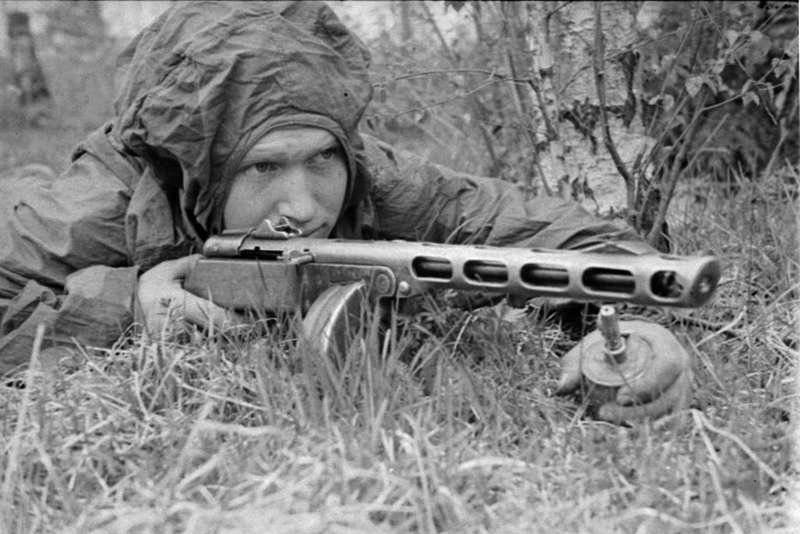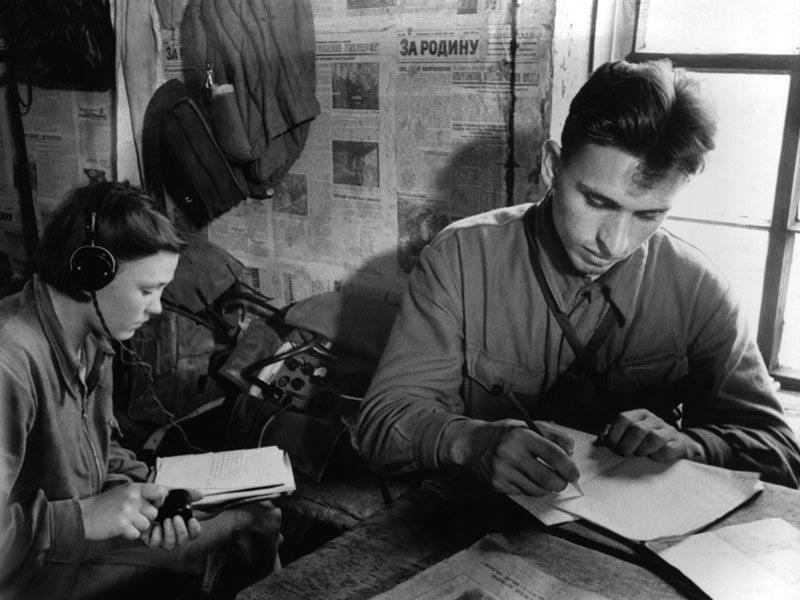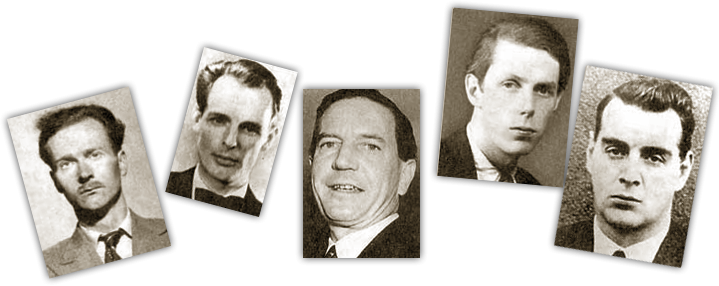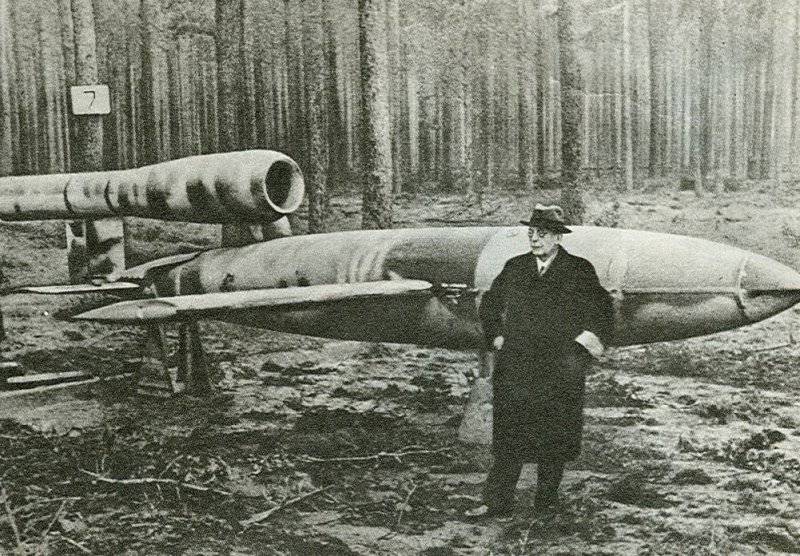Invisible Front: Soviet Intelligence of the Great Patriotic War

Preparations for large-scale battles between fascist Germany and the Soviet Union were accompanied by a global confrontation on the "invisible front." In many ways, the success in the Great Patriotic War depended on who would be the winner in it.
Before the beginning of the war, and in its early years, the National Security Commissariat and military counterintelligence agencies dealt with issues of state security of the Soviet Union.
The activities of intelligence organizations intensified significantly in the 1940 year, when it became apparent that Germany was preparing to attack the Soviet Union. It is noteworthy that the first warnings about the possibility of a Nazi attack on the USSR began to arrive long before 22 June 1941. The first such news began to come back in 1940 from Tokyo and Bern, and a little later from Berlin, Washington, London, Ankara, Warsaw. Most of the information came through political diplomatic channels.
Since the summer of 1940, the Soviet military intelligence, headed by FI Golikov, kept under control basic information about the movements of the German troops, the military potential of fascist Germany, the total number of its troops, the number and composition of formations. It was also determined the number of armies, corps and divisions that were deployed to the borders of the Soviet Union, as well as their weapons.
In total, up to 1941, the order of 22 reports and the date of the start of hostilities by Germany against the USSR was received. It is clear that there was a big inconsistency in dates, as well as a sufficient amount of misinformation (German intelligence also did not sit with folded arms, but constantly spread the disinformation it needed). There are about 10-15 of such dates. But the main thing is not that. The main thing is that for the 10-11 days before the start of the war, about 28 reports were received with the exact date.
The most accurate and valuable reports that fascist Germany is preparing for an attack came from Richard Sorge from Tokyo, who worked at the German embassy in Japan, and therefore had access to secret data, in particular, to Eigen Ott's correspondence (German ambassador to the Land of Ascending The sun). The first report from Sorge arrived about a month before Hitler signed the infamous “Barbarossa Plan” (this happened on November 18 of the year 1940). Sorge noted that 80 of fascist divisions was concentrated on the borders with the USSR. Later, at the beginning of 1941, he repeatedly transmitted information that the Germans were concentrating their forces on the borders, transferring troops from France. He also announced the completion of the construction of German fortifications on the eastern borders. Nevertheless, its two radiograms from 15 June have a special value, in which the exact date and time of the attack of the German troops on the Soviet Union was indicated.
However, the German attack on the Soviet territory of 22 June caught the Soviet intelligence by surprise. Therefore, there was a need for a radical reorganization of its activities. Even with irrefutable evidence of the preparation of the Germans for the attack, Soviet intelligence failed to adequately prepare for activities in a war. However, this situation remains on the conscience of the political leadership, which failed to assess the situation and quickly take the necessary decisions.
All this affected the speed of intelligence. First, all the activities that had been outlined earlier were carried out slowly, and secondly, the activities for the mobilization of intelligence services could not meet the deadlines. This was explained by the fact that in order to maintain such associations in combat readiness, systematic work is necessary for at least several years. Thirdly, the principle of offensive military operations in enemy territory had a great influence on the nature of the events held. That is why the beginning of the war was unexpected for Soviet intelligence, since everything that was happening was contrary to its pre-war preparation.
Therefore, from the very beginning of the war, the Intelligence Agency launched a vigorous activity to prepare effective intelligence in the new conditions. Volunteers were selected to work in intelligence agencies. The advantage was those who were familiar with the radio business. The training lasted depending on the level of general education and military training, as well as on how long it was planned to use this or that intelligence officer in the rear of the enemy. The longest training lasted from radio operators. They needed to study the walkie-talkies in detail, and also to listen to the order of 100-200 marks per minute.

Practically from the first days of the war, intelligence began to dispatch sabotage and reconnaissance groups and troops to the enemy’s rear, and also organized partisan detachments. So, only in the first two months of the war 17 guerrilla units were formed, about 500 reconnaissance, 29 reconnaissance and sabotage groups were deployed. And in 1943-1945 - even more, about 1900 of such groups with a total of about 10 thousand people, and also about 15 thousand people of the local population were involved in the work. During the same period, about 170 thousands of various documents were obtained, and information was obtained on holding secret negotiations between Hitler and Mussolini, Horthy and Antonescu, who testified that the allies of the Soviet country were negotiating for Germany’s one-sided surrender. An important role in obtaining this information was played by foreign intelligence, which operated in the territories of Switzerland, Iran, Turkey, England, France, and the United States of America. Time proved that such activity was necessary not only to determine the plans of the enemy, but also to find out the plans of their own allies, since they did not really want to share them with the USSR.
Partisan detachments and formations, which were entrusted with the task of gathering information in the enemy troops, disrupting operations, carrying out sabotage on objects and communications, were of great importance in the activities of military intelligence. From the beginning of 1943, operational centers began to form on the basis of partisan detachments that were to be engaged in organizing intelligence activities. In each of these centers there was a radio center for communication with the front staffs. In January, the Omega center, which controlled the districts of Kiev, Pripyat, Bakhmach, started operating in the partisan detachment of N. Fedorov, which was supposed to detect German groups and monitor the transfer of reserves by the Germans. The center of I. Banov was also active in the Minsk region, Brest. In the summer of 1943, an operational center of the Republic of Uzbekistan was established under the command of A. Brinsky, which operated in the vicinity of Kamenets-Podolsky and Kovel. There was a large network of agents, which was engaged in collecting information on the transfer of Nazi troops. The Brinsky Center has had a great influence on the planning and conduct of the Belarusian operation.

As for foreign intelligence, the conduct of intelligence activities abroad was entrusted to the First Main Directorate of the NKVD. It conducted joint operations with the British SIS to eliminate the agent network in Afghanistan, Iran and Turkey. One of the priority tasks of foreign intelligence was to obtain data on the situation in Germany and the definition of its military-political aspirations on the Eastern Front. And since most of the foreign intelligence agents who operated on the territory of Germany before the war, were destroyed, Lieutenant-General P. Fitin, who was the head of the PGU NKVD of the Soviet Union, set the task for the London-based intelligence network to fill in the missing information. It should be noted that, despite the fairly strong position of British agents in Germany (they had access to the Fuhrer’s immediate environment, the Abwehr, the scientific community engaged in the development of nuclear weapons), they did not hurry to share information with the USSR. Information obtained from the "Cambridge Five" (recall, this is a network of Soviet agents, which operated in the UK and which included Kim Fibli, Donald McLean, Anthony Blunt, Guy Burgess and John Kernkross) was extremely important. But Stalin was very suspicious of the British, who on the eve of the war were spreading a cipher in America that the USSR was allegedly preparing a warning strike on Germany. Therefore, the information provided by them was not taken into account. For example, in 1942, London received information about Germany’s preparation for a new offensive in the North Caucasus and Stalingrad region - what this led to, we all know very well. The attitude of the Soviet leadership to the intelligence information received from London changed only in the 1943 year, when it became obvious that all the data were reliable, since they were obtained directly in the circles of the German military command. It was from the London agents that information was received about the preparation by the fascists of the operation “Citadel” near Kursk. According to the agents, Hitler decided to recoup for Stalingrad. The fact that these data were taken into account, and the preparation of countermeasures against the Citadel was begun, eventually led to a turning point in the war.
Soviet military intelligence was also active in the dissemination of misinformation. In the course of all operations, reconnaissance of military units acted, as well as reconnaissance from the air. Very often, during operations, night searches were used to capture prisoners, ambushes were set up, raids, reconnaissance in force and surveillance were conducted. Radio intelligence also operated effectively, which in the last years of the war had gone deep into enemy territory for many kilometers.
Summing up a certain result of the activities of Soviet military intelligence during the Great Patriotic War, it should be noted that it was largely thanks to the data obtained by it that victory in the war was won. Her activities were highly valued not only by the Soviet political leadership, but were repeatedly noted by the fascist ruling circles. During the largest battles, intelligence played a huge role. Thus, in the battle of Moscow, intelligence provided complete information about Army Group Center: the number of divisions and tank groups. During the battle of Stalingrad, it was intelligence that provided information that the Germans had new Fau rockets, Tiger tanks, and Ferdinand self-propelled artillery mounts.
On the basis of information provided by military intelligence officers, the Soviet command had a complete picture of all the plans and intentions of the Germans. During the war, thousands of sabotage and reconnaissance operations were carried out, a large number of German soldiers and officers were captured, many important documents were obtained, a huge amount of communications were destroyed and thousands of trains with manpower, equipment and food were derailed.
Despite the fact that the beginning of the war was a great test for Soviet intelligence officers, they managed to withstand it with dignity. They honorably fulfilled their duty, defending the freedom of the Motherland and the right of its people to a peaceful life.
Materials used:
http://militera.lib.ru/research/kolpakidi_prohorov1/07.html
http://www.oxpaha.ru/newsection151_603_52788
http://www.istorya.ru/referat/6227/1.php
The film tells about unknown details of the work of fighters of the invisible front - military intelligence officers. During the Great Patriotic War, they risked their lives in order to obtain invaluable information about the enemy.

Information